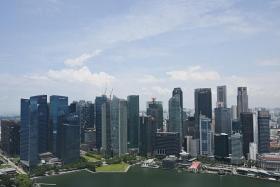Budget 2017: Water prices to go up 30 per cent
Budget 2017: Water to cost 30 per cent more, but there's help for some households
From July 1, water tariffs will go up to reflect the higher costs of water production.
But lower-income households will get help to offset the increase, Finance Minister Heng Swee Keat told Parliament.
He announced the water price revision - the first in 17 years - in delivering a forward-looking Budget yesterday.
In his first speech in Parliament since suffering a stroke in May last year, Mr Heng called water sufficiency a matter of national survival.
He said the price hike reflects the higher costs of desalination and NEWater production, which Singapore had invested in heavily to make our water supply more resilient.
"The cost of water production and transmission has increased as we build more desalination and NEWater plants, and lay deeper pipes through an urbanised environment," he said.
With the demand for water expected to rise, PwC Singapore sustainability leader Fang Eu-Lin said the investment is "costly but necessary to safeguard our water supply".
The new prices will better reflect the real cost of water and advocate sustainability from both a resource and financial standpoint, she added.
Once the 30 per cent hike is fully phased in by July next year, the increase for 75 per cent of businesses will be less than $25 a month. For 75 per cent of households, it will be less than $18.
Mr Heng said the Government will help offset the higher prices with additional U-Save rebates. For these households, the hike will be less than $12, with no increase on average for one- or two-room households.
Five-room flat dwellers like Madam Lydia Chai, 56, will see an average increase of $13 in water bills. After the additional U-Save rebate, the rise is $8.
The housewife told The New Paper: "Even with rebates, the increase adds up to about $100 a year. Every bit counts, especially when the economy is not doing well."
She tries to conserve water, like watering her plants with water used to wash rice.
But Budget 2017 also has goodies in the form of grants and GST Vouchers, along withinitiatives to help businesses, workers and families manage the transition.
On the economic front, the Budget has measures to address near-term concerns, particularly for sectors facing cyclical headwinds. It also sets out how we will implement our medium-term economic strategies to create new opportunities and jobs, said Mr Heng.
On the social front, there is help for families who wish to buy a home, experience the joys of parenthood and see their children through post-secondary education.
Said Mr Heng: "Budget 2017 outlines how we can thrive in an uncertain and rapidly changing world. It is a call for us to pull together - the Government, firms, unions, community organisations and individuals - with everyone doing their part.
"Our bonds will help us develop greater resilience in the face of unexpected shifts and improve our ability to adapt."
Get The New Paper on your phone with the free TNP app. Download from the Apple App Store or Google Play Store now



